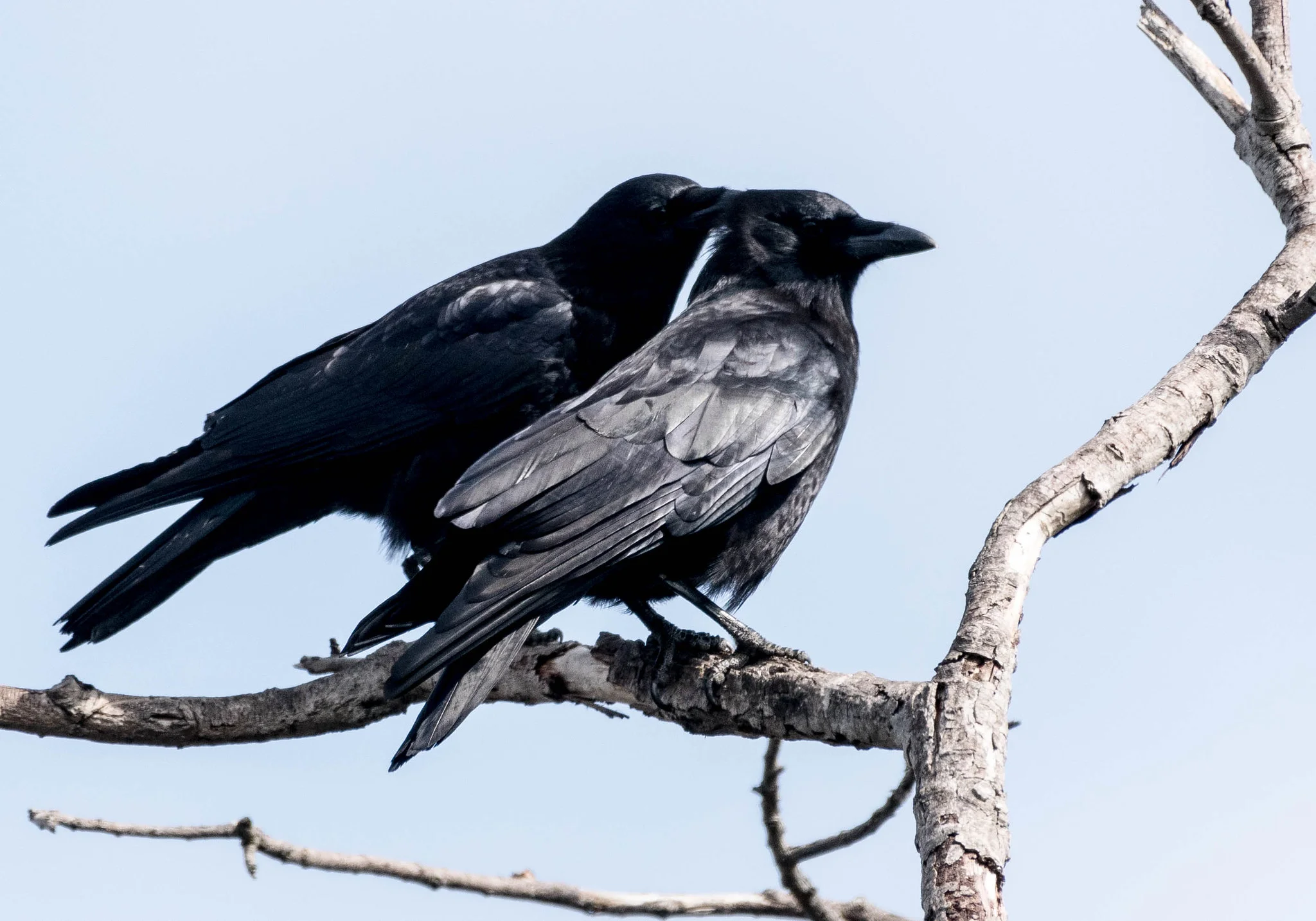Crows are ubiquitous, being observed around the world in an assortment of different locations. They are often seen in pairs, so this leads people to wonder about crow loyalty. Do crows mate for life?
Yes, crows do tend to mate for life. This breeding strategy is beneficial to crows when it comes to raising offspring. Crows are considered to be socially monogamous species. However, as we know from human relationships, a creature can be committed to an individual and still pursue other options. This is the case for crows – they are socially monogamous but not necessarily loyal to a single partner.
Well, that answers the question, “Do crows mate for life?”. However, that opened the door for an assortment of additional questions related to crows mating. For instance, “When do crows mate?” certainly warrants an explanation. Let’s take a look!
When Do Crows Mate?
The time of year in which a crow mating will be is dependent on the type of crow and the location in which it lives. However, generally speaking, when do crows mate?
Crows in Europe and North America tend to mate between March through May as the weather begins to warm. This allows these species to coincide the time in which they’re raising offspring with the most bountiful time of year. However, when do crows mate in the tropics?
Well, crows that live in tropical locales can breed at any point in the year since the weather is not a limiting factor to nesting. Yes, any time of year will provide plenty of food for these corvids to raise their young.

How Do Crows Find A Mate?
The range of crows can be quite large, so how do crows find a mate?
Well, males attract the attention of potential mates by making a wide range of noises. Although they have a complicated relationship with many of their fellow passerines, they are nonetheless songbirds. This means that crows have an immense vocal repertoire. Therefore, they are capable of producing an impressive array of sounds and noises.
Males try to get a female’s attention as the breeding season approaches. They will make specific caws, coos, growls, and clicks to accomplish this. Females who need a mate may fly in to evaluate the male if he sounds like he may be a suitable partner.
Once a male crow sees that a female has flown in to investigate him, he will begin to make bowing movements toward her as he continues to produce the array of mating noises.
Females will fly off and evaluate other options if males do not live up to their standards. If a female shows interest in a male, she will remain in the area. The potential pair will then continue with the crow mating ritual.
Crow Courtship Rituals
Now that I’ve discussed the question, “How do crows attract mates?” it’s time to discuss crow courtship.
Crow courtship rituals involve a series of elaborate displays and demonstrations that are initiated by the male. Males initially catch the eye of a female by bowing and showing off their feathers.
If a female remains in the area after this initial stage, then the nuzzling phase will commence. Nuzzling is a process through which males gently rub their beaks against the beak of a potential female mate.
A female that approves of the nuzzling display will prompt a male to initiate a process in which he dives at a female to show off his physical prowess.

Females that remain interested in a male after these first few stages of courtship will join males in a series of flights and preening sessions whereby they solidify their bond together.
Establishing a territory is the final act of courtship before a pair of crows mating can commence.
Pairs will defend their territory and chase away intruders such as hawks and other crows.
Are Crows Loyal To Mates?
Do crows pair for life? Recall that the answer to this question is yes, but this doesn’t guarantee that they will be loyal to their partner. But wait, what does that mean – are crows monogamous or not?
Well, crows will usually continue their partnership until one of the birds dies. However, pairs who experience several failed attempts to successfully raise offspring may separate. Otherwise, crows do not tend to separate once they have formed a mated pair bond. This means that they’re more loyal than other, smaller songbirds.
Socially Monogamous Birds
Although a crow will mate with the same individual every year until one of the pair members dies, this does not necessarily mean that a crow is strictly committed to its partner. The seemingly strong social bonds between crows are frequently subjected to extra-pair copulations.
An extra pair copulation is an event in which a bird mates with a bird that is not its monogamous partner. Males and females may seek out these extra-pair copulations despite having a partner.
This makes the question, “Do crows mate for life?” a bit more nuanced. These birds do mate for life, but their bonds are not strong enough to prevent the partners from cheating on one another.
You may be shocked at the promiscuity of crows, but this is normal animal behavior. All animals have the instinct to pass on their genes and produce offspring. This urge may lead birds to take advantage of extra-pair copulation opportunities. Such opportunities present an additional chance to pass on their genes to another generation.
Birds do not care about the concept of loyalty, as this idea is a human construct. However, if they are in a monogamous relationship, they will want to inhibit others from mating with their partner so they can ensure that the offspring will have their genes. Therefore, when crows seek extra-pair copulations, they will have to be sneaky to avoid a hostile reaction from their partner.
All this is to say that the question, “Are crows monogamous?” is quite complicated.

How Often Do Crows Mate?
Most crows will lay one clutch of eggs annually. However, this does not mean that crows mating is a one-time occurrence. Crows may engage in the cloacal kiss several times a day during peak breeding season. This behavior is common for many birds.
Frequent bouts of mating reinforce the pair’s bond to one another and ensure that a batch of eggs will be successfully fertilized.
How Do Crows Replace Mates?
Crows are not likely to replace a mate unless their previous mate has died. The exception to this generalization is that crows may look to separate from a partner after a failed breeding season. A failed breeding season could be one in which several clutches of eggs were laid, but no young were successfully raised.
Crows will look to replace a mate if their previous partner has died. In these instances, males will begin advertising their availability once again, while females will assess potential male partners.
What Age Do Crows Mate – When Are Crows Sexually Mature?
The exact age at which a crow is sexually mature is dependent on the species of crow. However, generally speaking, it takes a few years for crows to become ready to mate.
In their first couple years of life, many crows will remain in the presence of their parents and help to raise the next generations of crows – their siblings. This cooperative breeding system leads to a very high proportion of young surviving into their adult years.

The extra help around the nest deters predators, leads to more opportunities to collect food, and gives young additional adults from which they can learn.
After two or three years, many crows will disperse and try to start their own family, though some may remain in a cooperative breeding system with their parents until they are four or five years old.
Conclusion
Let’s do a quick recap; in this article, there was plenty of information about crow mating discussed. The major takeaways are:
- Do crows mate for life?
- Yes
- Are crows monogamous?
- It’s complicated, but they are socially monogamous
- How do crows find a mate?
- Crows find mates by making a wide variety of noises to attract potential partners
- When do crows mate?
- Crows can mate any time of the year in many areas, but they will wait until after winter in places that experience such seasons
Crows have a ritualized mating system in which an extensive courtship process will take place before a pair solidifies their bond with one another. Once bonded, crows will usually produce one clutch of eggs per year.
Both sexes could try to seek extra-pair copulations in an attempt to increase their chances of passing on their genes, but they will usually remain in a monogamous relationship with an individual until one of the individuals in the partnership dies.
Remember, the answer to, “Do crows mate for life?” is yes, but things can get a bit messy among crow couples.
I recommend reading this article about magpies if you would like an answer to the question, “Do corvids mate for life?”.

